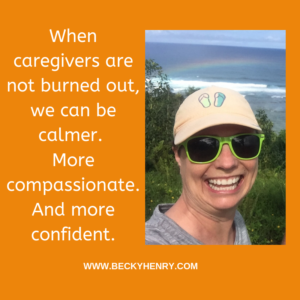 If you’re a practical person like me, you’re likely thinking, “Oh sure, sounds good on paper or in a research lab.” Finding time to rest when you’re a caregiver, even if your loved one is away at treatment can feel impossible. And even if one can find time, how do we turn off the spinning worries, thoughts, fears, etc? And why? Our loved one’s lives are in danger and some random coach is pushing rest…why?
If you’re a practical person like me, you’re likely thinking, “Oh sure, sounds good on paper or in a research lab.” Finding time to rest when you’re a caregiver, even if your loved one is away at treatment can feel impossible. And even if one can find time, how do we turn off the spinning worries, thoughts, fears, etc? And why? Our loved one’s lives are in danger and some random coach is pushing rest…why?
I feel your pain. And I have a long history of failing tremendously at giving my body, mind and spirit the rest it needs and deserves. And you may be thinking, “Come on Becky! You already push us to practice self care…now we need to add rest too?” Well, it is a form of self care so maybe we look at it as another form of self care.
As a fellow traveler on this journey to figuring out how to not burn out, I decided to research the value of rest. What inspired this? Well, I finally took a ten day vacation from work for the first time in as long as I can recall. Other than a week off over the holidays last December, it’s been a long time. It did me so much good to take that time off. Life felt fun, and light, and sunny and had a lot more peace, joy and ease. And my body wasn’t as tired. Huh. What a concept. LOL The benefits also match up with the research on resting and taking time to retreat from our work. Since vacation I have noticed; increased productivity, more creativity, more resilience (4.5 hours in the dentist’s chair was some pretty bad ass resilience if you ask me), better sleep, more enjoyment of my work and my short term memory even seems better! And the Spanish lessons I’m doing on an app seem much easier. WOW!
So, for my fellow science geeks…let’s look at the research first for the WHAT and WHY, and then we will get to the HOW…
WHAT exactly is REST? This 2015 research (Glob Qual Nurs Res. 2015 Jan-Dec; 2: 2333393615583663.
Published online 2015 Apr 29. doi: 10.1177/2333393615583663) published on NIH by Margaret Asp of Sweden, defines rest and non-rest like this, “The essence of rest is being in harmony in motivation, feeling, and action. The essence of non-rest is being in disharmony in motivation, feeling, and action.” I like the concepts mentioned as well of rest being anything that feeds our body, soul and spirit whether it is alone or with others.
WHY do we need REST? As Margaret Asp cites in the research; “People need rest to recover from strains and illness to maintain health (Han, 2013; Svenson, 1990).” Many of us can recall times when we had an illness, procedure or surgery from which we needed to rest to recover. I also like the concept of comfort helping us to rest and recover.
Because I have heard from so many of you that you’re drained and have diminished capacity, I’m going to share this quote from the NIH paper by Asp, “The term rest is both a noun and a verb. Rest means “respite from labor or exertion of any kind” and “refreshment or repose obtained by a pause in activity” and “freedom from trouble, distress, molestation, aggression and so forth; a state of peace” (Oxford English Dictionary, 2012). Westrin (1909) defined rest as a relative phenomenon and always related to movements and Swedenberg (2000) described rest as a process overcoming physical or mental fatigue or weariness. Accordingly, the term rest comprises of both a process (to rest) and a condition (being in rest).”
Many parents have told me that it seems impossible to have peace. So, let’s talk about the HOW to rest.
Not so easy, especially for family caregivers. It doesn’t have to be sleep or even a nap. Anything that feeds that body, mind, soul and spirit whether alone or with others will do. Just reading this piece in Scientific American on Why our Brains Need Downtowtime made me want to stop writing and go lay down. LOL. Here are some HOW ideas I came up with (feel free to share yours in the comments on my social media on Monday or on my blog or send me an email:
- Sitting with or playing with pets
- Anything outdoors, specifically in nature not a noisy city
- Joyful movement
- Laughing with others
- Napping
- Creative activities that bring joy and contentment
The ideas I shared above are very global and general, how can you find more specific ways that you in particular find enjoyment, peace, harmony in; motivation, feelings and action?
After reading about Europe’s mandatory 20 days off, I’m looking forward to being there this fall for a few months. For my weekly group support participants, I’ll be sending out a Doodle Poll on alternate times of the day for our calls during that time. I can’t do midnight…gotta rest. 😉
For more on self care, check out my interview, “#103 Tools for Caregivers During Difficult Times” with Robyn Goldberg, RD on her Podcast, “The Eating Disorder Trap.” Follow the link to hear the interview.
We appreciate our sponsors who allow us to provide so many services for family caregivers. Today we’re highlighting our sponsor, Monte Nido and Affiliates who are opening their newest adolescent program at Clementine in St. Louis!

